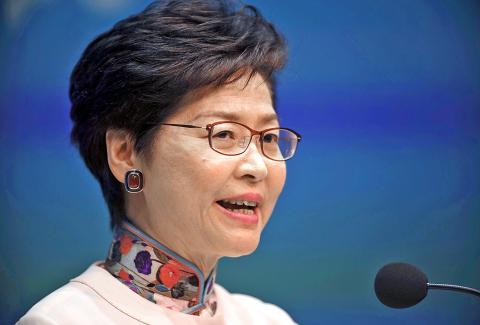Hong Kong is banning alternative smoking devices — the latest setback to the tobacco industry’s efforts to find growth markets as cigarette demand shrinks worldwide.
In a surprise reversal, the territory plans to impose a ban on e-cigarettes, a next-generation category of smokeless tobacco products, Hong Kong Chief Executive Carrie Lam (林鄭月娥) said in a policy address yesterday.
Hong Kong joins at least 27 nations that have banned next-generation smokeless devices, heeding advice from the WHO.

Photo: AP
The products have come under fire from health officials across the globe because of concerns about their appeal among young people.
The backlash is bad news for tobacco companies, which are investing billions of US dollars in developing products that could move the industry beyond cigarettes.
In its legislative proposal in June, the Hong Kong government had proposed only to regulate e-cigarettes the same way as conventional tobacco, including restricting their sale to minors and prohibiting advertisements and sponsorship.
Tobacco makers were looking to Hong Kong as a potential market for alternative devices.
A Philip Morris International Inc representative said it does not sell any of its new tobacco alternatives in Hong Kong, while Japan Tobacco Inc said it only sells paper cigarettes in the territory.
“A full ban of e-cigarettes will only make black market business more popular, not help to protect teenagers under 18 years old and consumers,” the Coalition on Tobacco Affairs said in a statement yesterday.
It added that none of its members are selling e-cigarettes or heat-not-burn devices in Hong Kong.
Japan Tobacco investors were unfazed by the news. Shares gained as much as 1.9 percent in Tokyo yesterday.
Philip Morris shares have tumbled about 27 percent from a peak in October last year.
The move comes as big tobacco companies have been increasingly pressured by tighter restrictions on smoking and the sale of cigarettes around the globe.
In the US, the largest market for e-cigarettes, regulators have taken a more severe stance on the devices after raising the alarms on their use by children and teenagers.
The US Food and Drug Administration said it is considering banning flavored versions of nicotine devices. Last month, it seized documents from Juul Labs Inc, which offers sleek e-cigarettes with flavors that appeal to underage users.
While some countries have taken a combative stance against e-cigarettes, others have looked to them as a way to curb smoking.
Regulators in several countries, including the UK and New Zealand, have backed the devices as potentially less risky compared with traditional cigarettes.
Hong Kong has one of the lowest smoking prevalence rates in the world, and about 10 percent of the population smokes, Bloomberg Intelligence data showed.

BYPASSING CHINA TARIFFS: In the first five months of this year, Foxconn sent US$4.4bn of iPhones to the US from India, compared with US$3.7bn in the whole of last year Nearly all the iPhones exported by Foxconn Technology Group (富士康科技集團) from India went to the US between March and last month, customs data showed, far above last year’s average of 50 percent and a clear sign of Apple Inc’s efforts to bypass high US tariffs imposed on China. The numbers, being reported by Reuters for the first time, show that Apple has realigned its India exports to almost exclusively serve the US market, when previously the devices were more widely distributed to nations including the Netherlands and the Czech Republic. During March to last month, Foxconn, known as Hon Hai Precision Industry

Taiwan Semiconductor Manufacturing Co (TSMC, 台積電) and the University of Tokyo (UTokyo) yesterday announced the launch of the TSMC-UTokyo Lab to promote advanced semiconductor research, education and talent development. The lab is TSMC’s first laboratory collaboration with a university outside Taiwan, the company said in a statement. The lab would leverage “the extensive knowledge, experience, and creativity” of both institutions, the company said. It is located in the Asano Section of UTokyo’s Hongo, Tokyo, campus and would be managed by UTokyo faculty, guided by directors from UTokyo and TSMC, the company said. TSMC began working with UTokyo in 2019, resulting in 21 research projects,

Ashton Hall’s morning routine involves dunking his head in iced Saratoga Spring Water. For the company that sells the bottled water — Hall’s brand of choice for drinking, brushing his teeth and submerging himself — that is fantastic news. “We’re so thankful to this incredible fitness influencer called Ashton Hall,” Saratoga owner Primo Brands Corp’s CEO Robbert Rietbroek said on an earnings call after Hall’s morning routine video went viral. “He really helped put our brand on the map.” Primo Brands, which was not affiliated with Hall when he made his video, is among the increasing number of companies benefiting from influencer

Quanta Computer Inc (廣達) chairman Barry Lam (林百里) yesterday expressed a downbeat view about the prospects of humanoid robots, given high manufacturing costs and a lack of target customers. Despite rising demand and high expectations for humanoid robots, high research-and-development costs and uncertain profitability remain major concerns, Lam told reporters following the company’s annual shareholders’ meeting in Taoyuan. “Since it seems a bit unworthy to use such high-cost robots to do household chores, I believe robots designed for specific purposes would be more valuable and present a better business opportunity,” Lam said Instead of investing in humanoid robots, Quanta has opted to invest